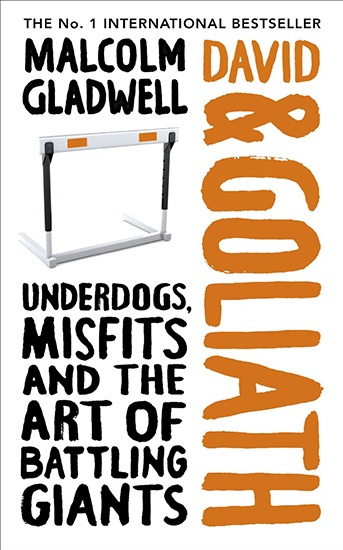What if what you thought was a weakness was actually a strength, or at least could be turned into one? And what if what you assumed was a strength was in fact a weakness?
That’s the premise of Malcolm Gladwell’s new non-fictional book, David and Goliath: Underdogs, Misfits, and the Art of Battling Giants. Each chapter in this book is based on one person’s story, which Gladwell then uses to explore larger ideas from the social sciences (history, psychology, sociology).
For example, a woman he calls Caroline Sacks is extremely bright and is very talented at science. For university, she chooses to attend prestigious Brown over the University of Maryland but ends up dropping out of science altogether. The reason is that she becomes, as Gladwell puts it, a little fish in a big pond at Brown, whereas she could have been a big fish in a little pond at Maryland. At Brown, she was no longer the smartest woman in her class but rather one of many smart people, and not necessarily among the top tier. She struggled with subjects that she had previously been good at and, perhaps more importantly, she found the competitive environment and the fact that other people were clearly brighter than her difficult to cope with. Gladwell notes, ‘She’s really, really smart. But Brown University made her feel stupid – and if she truly wanted to graduate with a science degree, the best thing for her to do would have been to go down a notch to Maryland.’ What Gladwell is getting at here is that what looked to Sacks to be a great advantage, or strength – i.e. going to an Ivy League school with other ‘really, really smart’ people – actually turned into a disadvantage. Gladwell then goes on to argue that affirmative action, which seems like a positive idea that will help many people, will in some cases in fact put them in a bad situation that will end up harming them.

by Malcolm Gladwell
305 pp., London: Allen Lane, 2013.
In another chapter, Gladwell discusses dyslexia, which seems to be a clear disadvantage. Who would choose to have trouble reading and writing? But Gladwell then gives examples of very successful people who turned their dyslexia into strengths of a sort; they recognised that reading and writing wouldn’t be their best skills and instead they focused on listening, for example, or social skills and networking. Gary Cohn was a difficult, disruptive child who didn’t seem to get much out of school. He was trying, but every day was a struggle because of his dyslexia. As he gets older, Cohn does things most people wouldn’t do, such as trying to network with successful people and talking his way into a job. In this way, he gets – or, rather, makes – opportunities for himself. It ‘turns out that learning how to deal with the possibility of failure is a really good preparation for a career in the business world’ and Cohn is now, as Gladwell points out, ‘the president of Goldman Sachs’.
There are many other examples along these lines. There is the Mennonite family whose daughter is tortured and murdered and yet they manage to forgive the perpetrator. There are the Huguenots who protect Jews during World War II because they understand what it means to be persecuted. There is the immigrant to the US who decides to coach his daughter’s basketball team to victory, though the girls on the team aren’t terribly talented or experienced. And so on.
Gladwell’s writing is always entertaining, and he peppers his works with interesting and relevant anecdotes. But often it stays on the level of an enjoyable anecdote rather than turning truly thought-provoking. This is because there will always be exceptions. There will always be smart people who excel in competitive environments and those who don’t. There will always be those who have had difficult backgrounds (Gladwell mentions a number of people who lost one of their parents when they were just children) but who manage to succeed nonetheless. There will be religious people who can forgive and move on, and those who can’t, and there will be non-religious people likewise. While it’s fascinating to hear that often people are more successful if they choose a less prestigious school or if they are ‘disagreeable’, as Gladwell terms it, that doesn’t change anything. You can’t make everyone top of their class; you can’t suggest that everyone behave in an anti-social way.
The problem really is: how do you know that you or your child might be one of the exceptions? How can you ensure that you are spurred on by difficulties and not stopped in your tracks? Well, the obvious point is that you can’t.
This book is worth reading, because Gladwell is an entertainer and he makes some fascinating points. But there are too many contradictions or unexplained points in the book. Gladwell is attempting to battle a giant of an idea, and he unfortunately doesn’t quite succeed.










